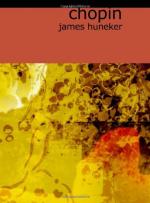The Preludes bear the opus number 28 and are dedicated to J. C. Kessler, a composer of well-known piano studies. It is only the German edition that bears his name, the French and English being inscribed by Chopin “a son ami Pleyel.” As Pleyel advanced the pianist 2,000 francs for the Preludes he had a right to say: “These are my Preludes.” Niecks is authority for Chopin’s remark: “I sold the Preludes to Pleyel because he liked them.” This was in 1838, when Chopin’s health demanded a change of climate. He wished to go to Majorca with Madame Sand and her children, and had applied for money to the piano maker and publisher, Camille Pleyel. He received but five hundred francs in advance, the balance being paid on delivery of the manuscript.
The Preludes were published in 1839, yet there is internal evidence which proves that most of them had been composed before the trip to the Balearic Islands. This will upset the very pretty legend of music making at the monastery of Valdemosa. Have we not all read with sweet credulity the eloquent pages in George Sand in which the storm is described that overtook the novelist and her son Maurice? After terrible trials, dangers and delays, they reached their home and found Chopin at the piano. Uttering a cry, he arose and stared at the pair. “Ah! I knew well that you were dead.” It was the sixth prelude, the one in B minor, that he played, and dreaming, as Sand writes, that “he saw himself drowned in a lake; heavy, ice cold drops of water fell at regular intervals upon his breast; and when I called his attention to those drops of water which were actually falling upon the roof, he denied having heard them. He was even vexed at what I translated by the term, imitative harmony. He protested with all his might, and he was right, against the puerility of these imitations for the ear. His genius was full of mysterious harmonies of nature.”
Yet this prelude was composed previous to the Majorcan episode. “The Preludes,” says Niecks, “consist—to a great extent, at least—of pickings from the composer’s portfolios, of pieces, sketches and memoranda written at various times and kept to be utilized when occasion might offer.”
Gutmann, Chopin’s pupil, who nursed him to the last, declared the Preludes to have been composed before he went away with Madame Sand, and to Niecks personally he maintained that he had copied all of them. Niecks does not credit him altogether, for there are letters in which several of the Preludes are mentioned as being sent to Paris, so he reaches the conclusion that “Chopin’s labors at Majorca on the Preludes were confined to selecting, filing and polishing.” This seems to be a sensible solution.




